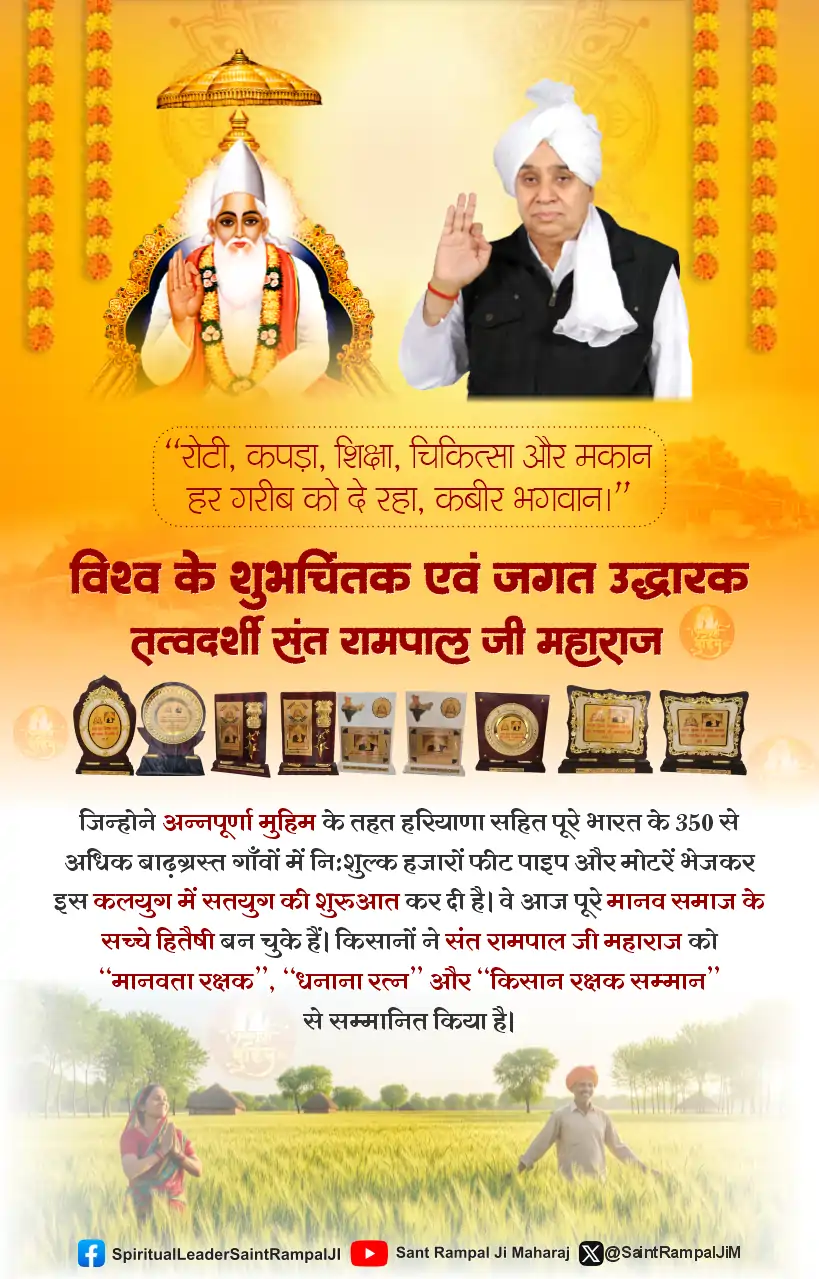The Bhagavad Gita, often referred to as the Gita, is a 700 verse Hindu scripture that is part of the Mahabharata epic. The Bhagavad Gita represents a synthesis of Hindu ideas about Dharma, Worship, and the yogic ideals of Emancipation. Being a Summary of the four Vedas, the Holy Gita is one of the main Religious Texts of Hinduism, in which the Spiritual Knowledge described is acceptable to all.
The Srimad Bhagavad Gita is a message from God to mankind delivered through Brahm. God has given the mysterious and profound knowledge through the medium of Bhagavad Gita. The Bhagavad Gita is a collection of about 700 verses that represent a dialogue between Shri Krishna and Arjun. Brahm through Shri Krishna said these verses on the battlefield of Kurukshetra at the time of the Mahabharata. The most important aspect of the Bhagavad Gita is that it contains knowledge about the Supreme God and also about the path to salvation and thus the method to end the cycle of birth and death. But due to ignorance there is Widespread Misconception among the devotees.
Let’s try to figure out myths prevalent in society about the Holy Gita verses and their real meaning.
Does the Sant, titled Gita Manishi, know That Brahm?
In fact, he does not even know that the Gita knowledge giver in Chapter 7 Verse 29 tells Arjun, “Those who know my entire spiritual knowledge (adhyatm) and all actions (Karma), those men, resorting to That Brahm, strive to get rid of old age and death.”
God Brahm (Kaal), the giver of the knowledge of In Gita Chapter 8 Verse 1, Arjuna asks, “what is that Brahm as given in Gita Chapter 7 Verse 29?” In Gita Chapter 8 Verse 3 Gita’s knowledge giver God Brahm replies – “He is Param Akshar Brahm.” After this, in Gita Chapter 8 Verse 5-7 Gita’s knowledge giver tells Arjun to do his devotion, and further in Chapter 8 Verse 8-10, he tells Arjun to worship some other “Param Akshar Brahm” (Sachchidananda Ghan Brahm). It has also been clarified that whoever worships me – attains me. He who worships that Brahm i.e. Param Akshar Brahm attains Him.
Then he tells, “the mantra of his devotion is one letter om, and the mantra for the devotion of That Brahm (Param Akshar Brahm / Divine God Sachchidananda Ghan Brahm) is of three names “Om Tat Sat“. In Gita Chapter 18 Verse 62, Gita’s knowledge giver tells, by taking the refuge of the same Param Akshar Brahm, it is possible to attain eternal abode “Sanatan Param Dham” (the same is called Satyalok / Amarlok by Sant Garibdas ji). Only the enlightened Sant Rampal Ji clarified this knowledge by drawing conclusions and explaining to Hindus through His videos. This knowledge was not understood well by our other Hindu Preachers/ Gurus/ Manishis and Mandaleshwars.


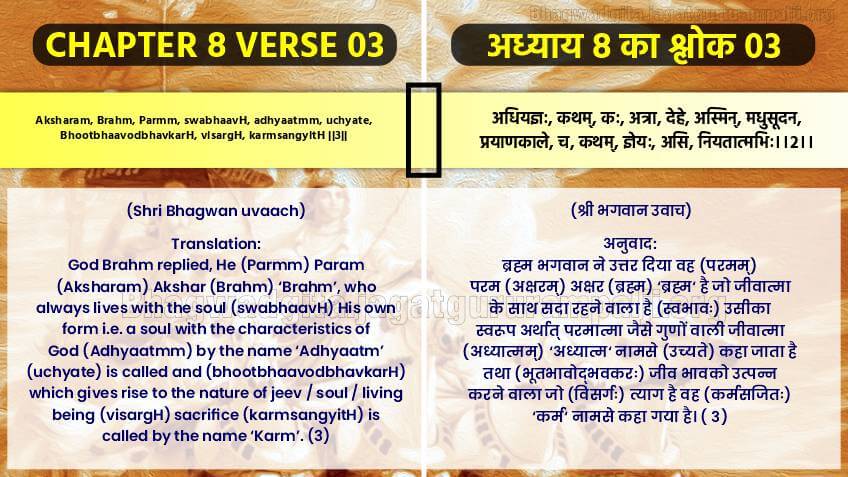
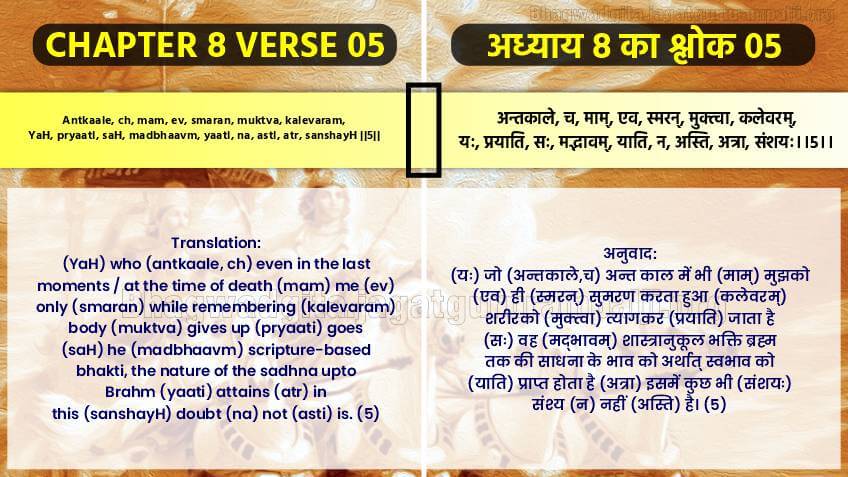
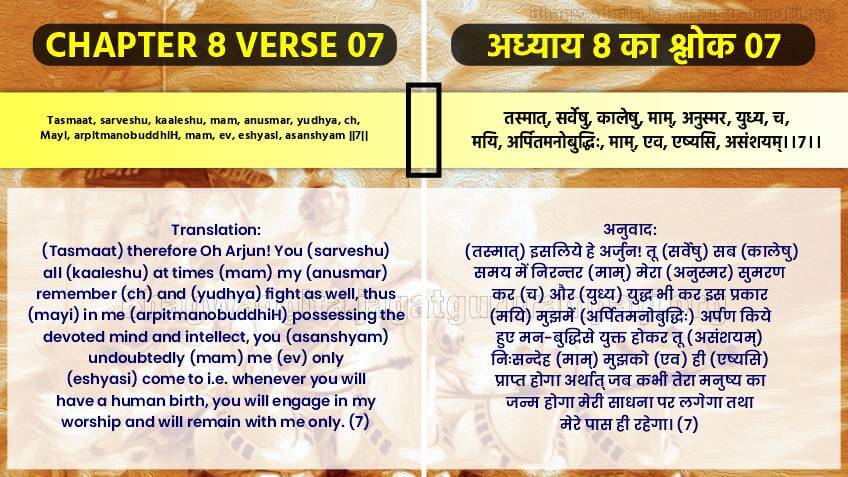
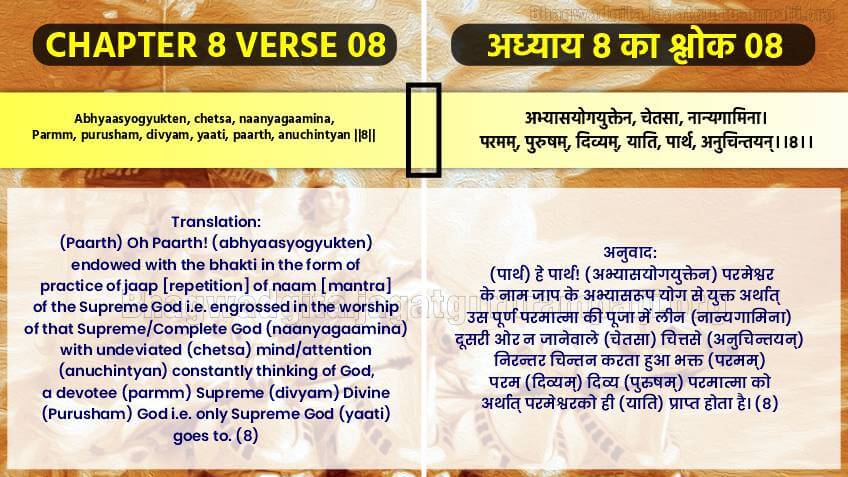
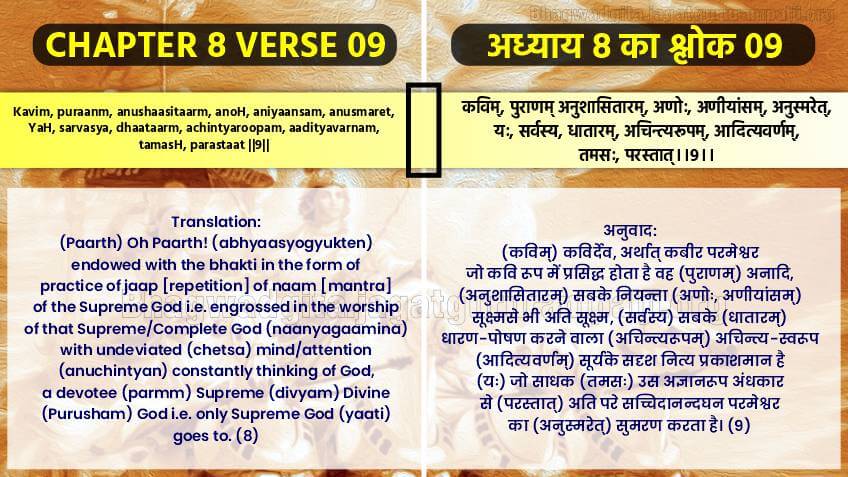
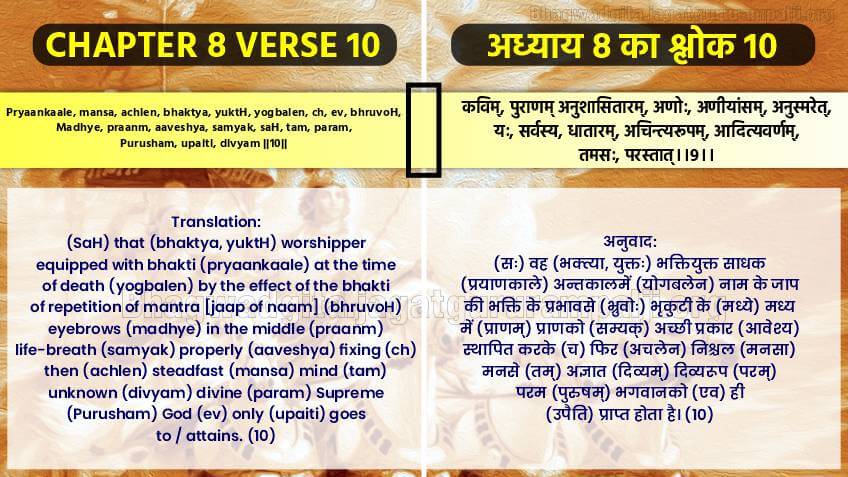
It is obvious that “Hindus did not understand the essence of Gita”.
Is Gita’s Knowledge Giver Immortal?
Hindu religious leaders and preachers Acharya, Shankaracharya, and Gita Manishi (mystics) call the knowledge giver of Gita (whom they call Shri Krishna, the incarnation of Shri Vishnu), immortal. They say he is not in the birth-death cycle. He has no parents. The seekers must read Gita Chapter 2 Verse 12, Gita Chapter 4 Verse 5, and Gita Chapter 10 Verse 2.
- According to these Verses, Shri Vishnu alias Shri Krishna says, “O Arjuna! You and I have had several births. You do not know all of them, but I know.”-Gita Chapter 4 Verse 5.
- “O Arjuna, neither it is that I (the Giver of the knowledge of Gita) was not there at any time, or you (Arjuna) were not there, or these kings were not there, and nor it is that we will not be there beyond this.” -Gita Chapter 2 Verse 12.
- “O Arjuna, neither do the gods, nor the great seers know my origin because I am the prime cause of the gods and the great seers in all respects.” -Gita Chapter 10 Verse 2.
Hindu brothers please read the photocopy of the above Verses – 4:5, 2:12, 10:2, and 16:24 of Srimad Bhagavad Gita Padchhed, Anvaya, printed by Gita Press, Gorakhpur, and translated by Shri Jayadyal Goyandka.
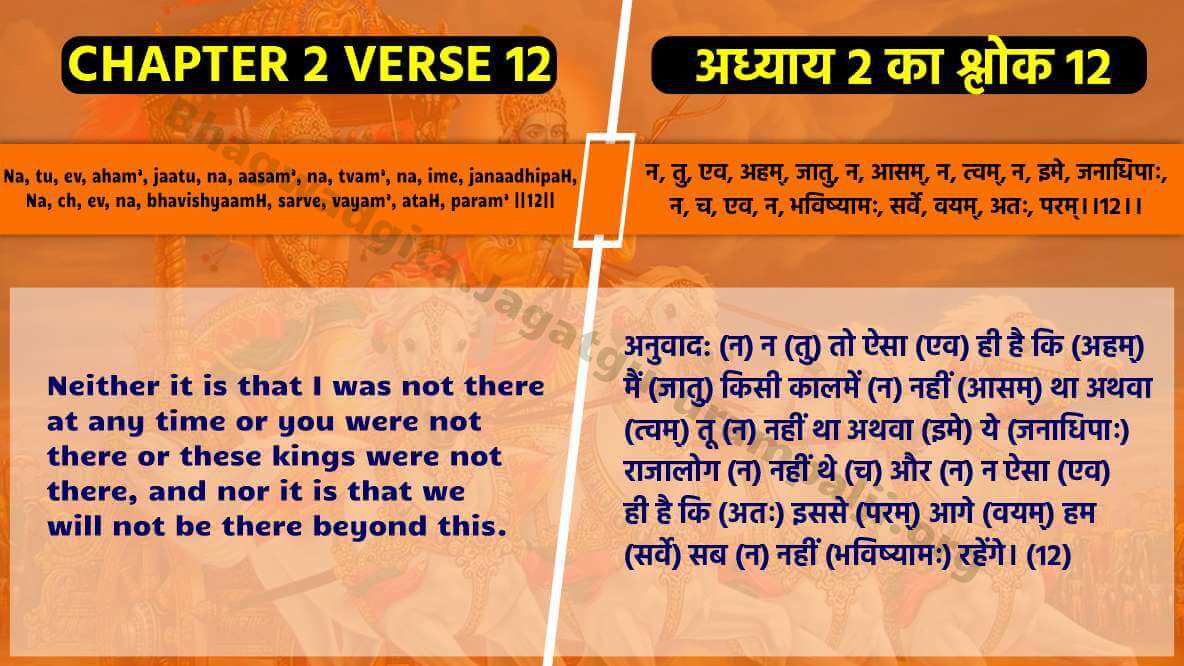
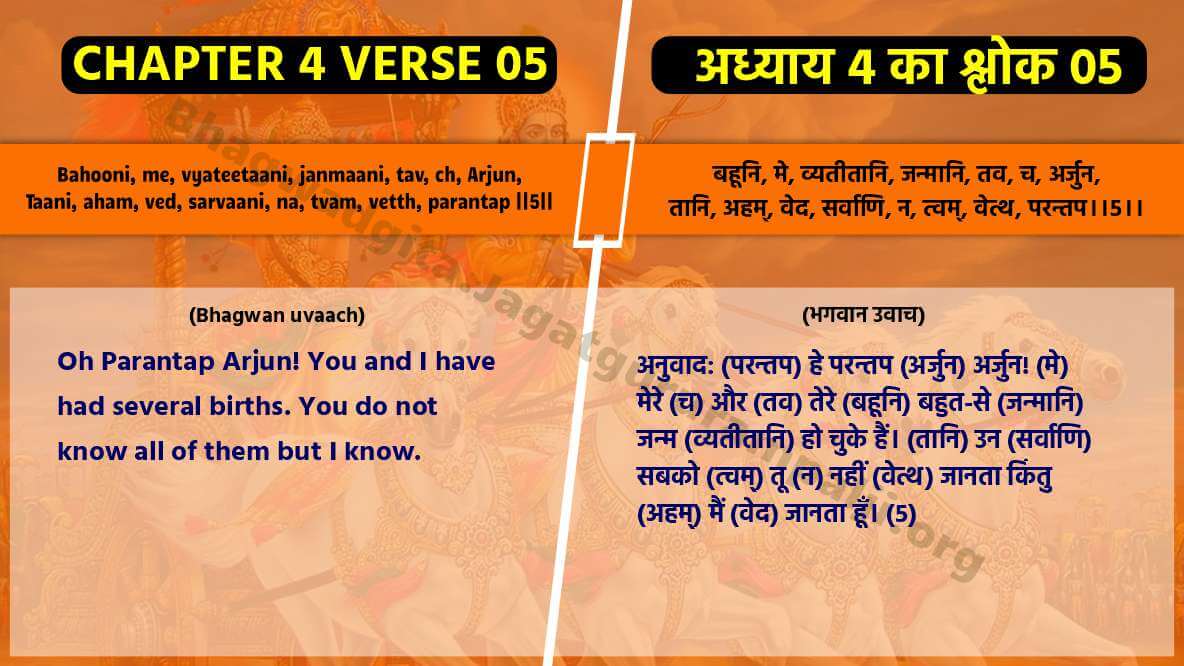
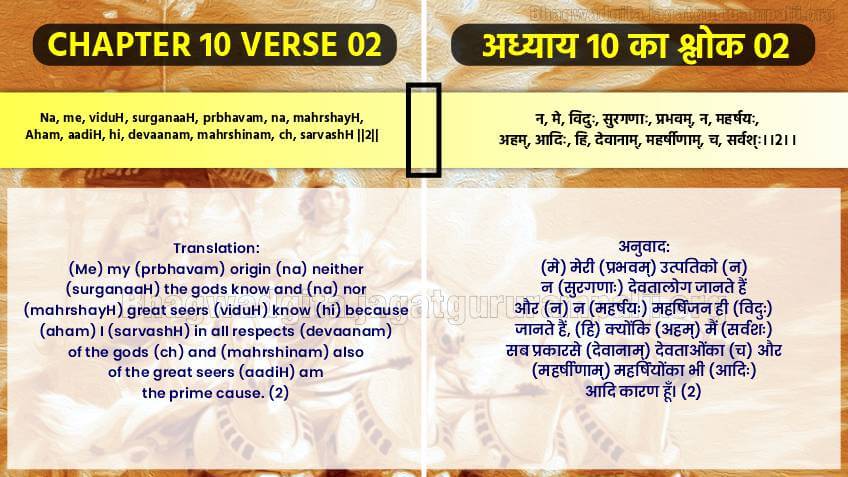
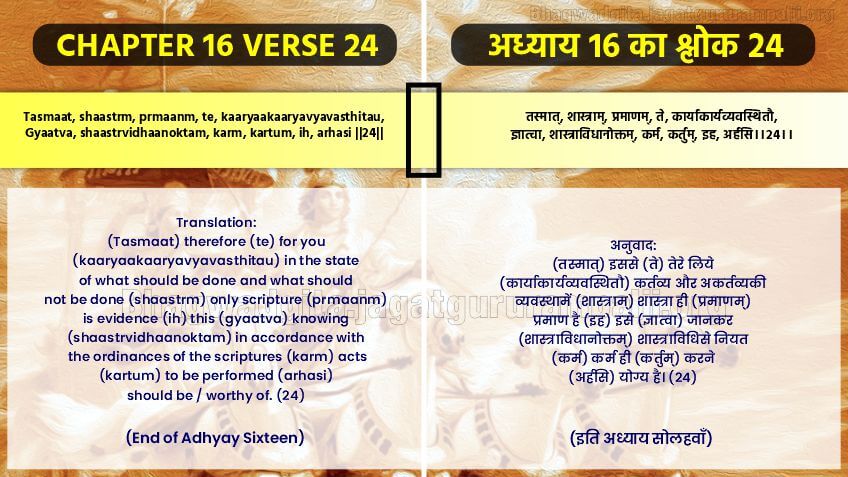
Just think, readers! One who is in the birth-death cycle is not immortal; he is perishable. Someone perishable is not All-capable.
If the knowledge giver of Gita (Shri Vishnu alias Shri Krishna) takes birth and dies, then who is the Immortal God beyond birth and death?
The answer to this question is stated in Gita Chapter 2 Verse 17, Gita Chapter 15 Verses 16-17, and Gita Chapter 18 Verses 46-61 and 62.
- Gita Chapter 2 Verse 17: – (The Giver of the knowledge of Gita has spoken the glory of God other than himself) You should know Him to be indestructible/immortal from whom this whole visible world has pervaded. No one can destroy this Immortal.
- Gita Chapter 18 Verse 46: – (In Gita Chapter 18 Verse 46, the glory of God other than himself has been told by the Giver of the knowledge of Gita) The God from whom all the living beings have originated and from whom this whole world has pervaded, by worshiping that God through the performance of one’s natural activities i.e. while performing worldly tasks instead of practicing Hathyog, a man attains spiritual success.
- Gita Chapter 18 Verse 61: – (The Giver of the knowledge of Gita has told the glory of God other than himself.) Oh, Arjun! Causing all the living beings, mounted on the body-like machine, to revolve according to their deeds by His Maya, the Omniscient God is situated in the heart of all the living beings.
- Gita Chapter 18 Verse 62: – (In this verse, the giver of the knowledge of Gita has asked Arjuna to go to the refuge of other Gods from himself with all the emotions.) Oh, Bharat! You, in every respect, go in the refuge of only that Supreme God. By the grace of that Supreme God only, you will attain the supreme peace and the everlasting place (dhaam/lok) i.e. Satlok.
- In Gita Chapter 15 Verse 16, it has been said that in this world, there are two types of Gods, Perishable and Imperishable. Likewise, in these two loks, the bodies of all the living beings are said to be perishable and the soul, imperishable.
- Gita Chapter 15 Verse 17: – In Gita Chapter 15 Verse 17, the giver of the knowledge of Gita has made it clear that the Supreme God is, however, someone else other than the two aforesaid Gods, Kshar Purush and Akshar Purush, who by entering the three loks, sustains everyone and is called as the Eternal Parmeshwar Parmatma (Immortal Supreme God).
Hindu brothers please read photocopies of the above verses for proof from Shrimad Bhagavad Gita Padachhad Anvay published by Gita Press Gorakhpur and translated by Shri Jaidayal Goyandaka:-
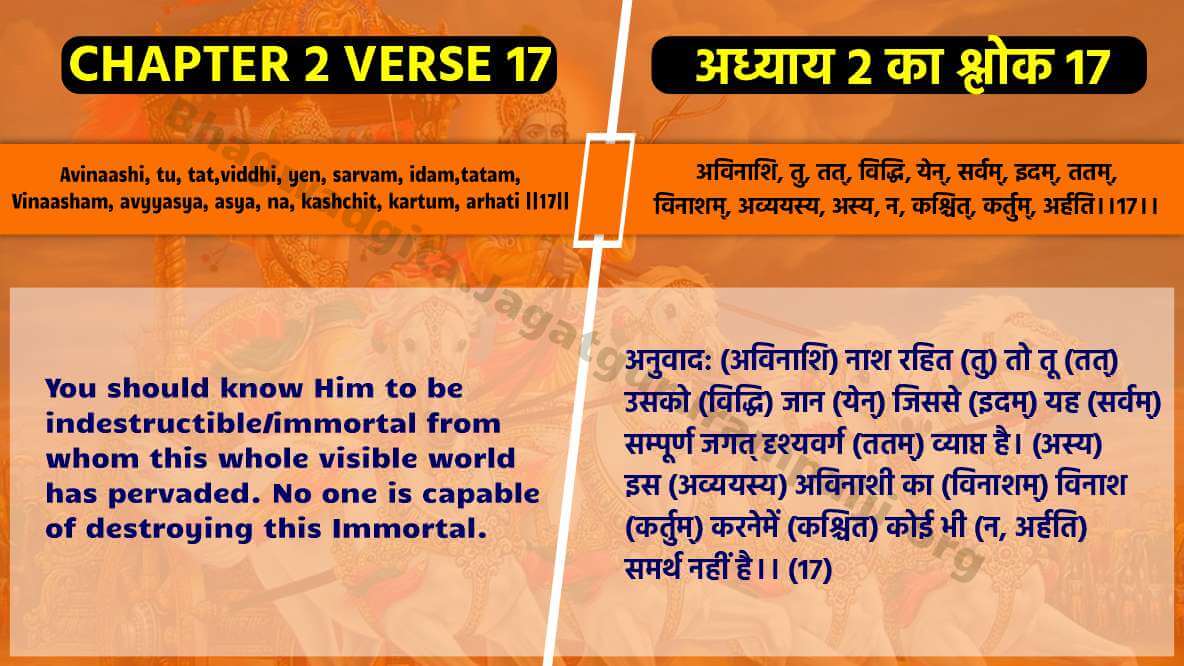
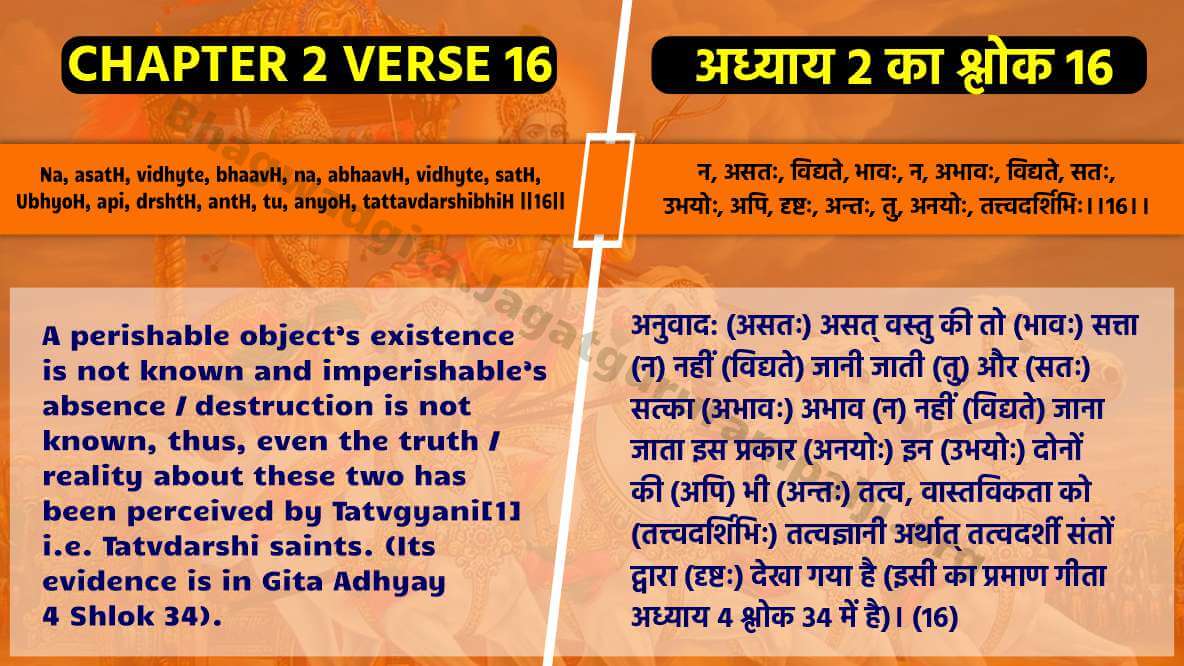
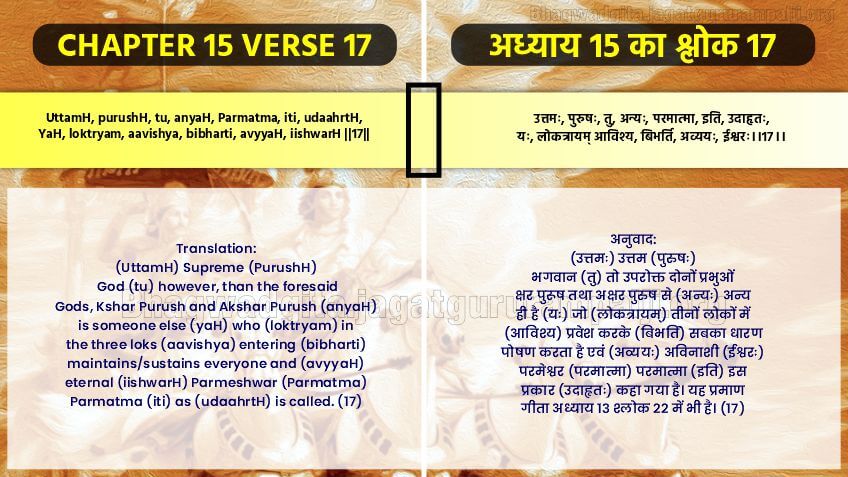
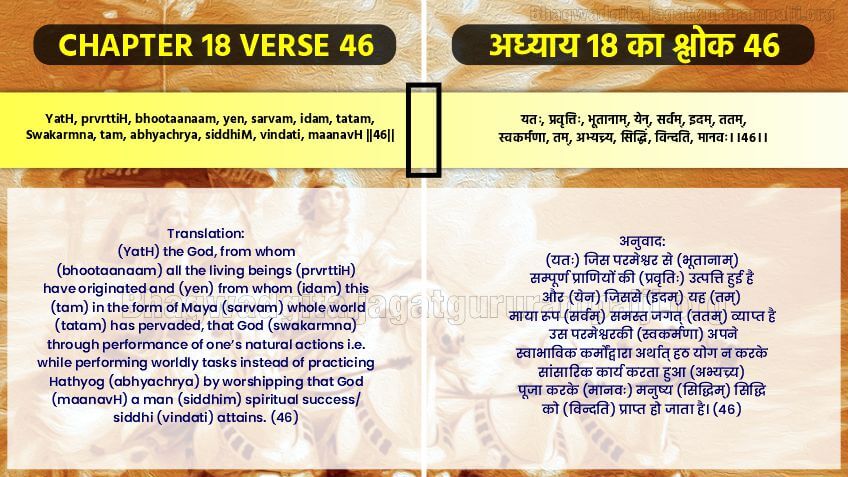
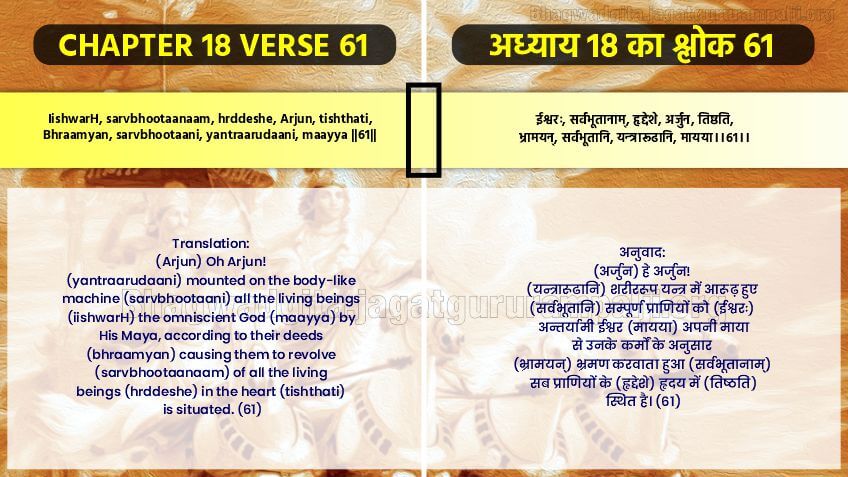
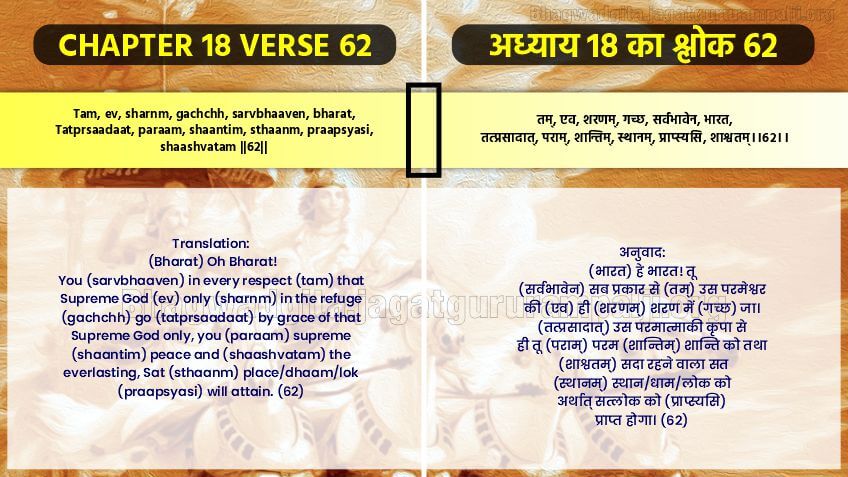
Closing eyes does not Remove Danger!
Hindu brothers! The cat’s danger cannot be avoided by closing the pigeon’s eyes. He is in a gross state of error. The truth must be seen with open eyes. One must accept the situation of danger. Everyone is educated today. Today, India is not a two-hundred-year age-old country where our ancestors were uneducated. The pious souls considered the ignorant religious preachers / Mahamandaleshwars / Manishis (Mystics) / Acharyas / Shankaracharyas as Gita scholars / Gita Manishis and relied on them blindly.
The Supreme God is, however, someone else other than the two aforesaid Gods, Kshar Purush and Akshar Purush, who by entering the three Loks, sustains everyone and is called the Immortal Supreme God (Avinashi Parmeshwar). Our ancestors’ eyes closed without substantiating the scriptures, kept blind faith in their lies and destroyed their precious lives by practicing the tradition of arbitrary devotion. The entire holy Hindu society is confused by the fractured philosophy of these preachers. Now you should open your eyes and revisit Gita afresh once again.
Arbitrary conduct cannot give any benefit by abandoning the holy scriptures
In Gita Chapter 16 Verses 23, it has been said, “O Arjuna, he who, abandoning the injunctions of the scriptures, acts according to the whimsical desires, neither attains siddhi/perfection, nor supreme state/salvation, nor happiness.”
Here Hindu brothers should consider that devotion is done for these three things.
1. To achieve happiness in life.
2. To accomplish the work without a crisis.
3. Attain salvation.
These three objectives cannot be fulfilled by practicing devotion unsubstantiated by the scriptures. Therefore, what Gita doesn’t prescribe, shouldn’t be attempted. Gita Chapter 16 Verse 24 clarifies, “in the state of what should be done and what should not be done, Scripture is the only evidence for you. Knowing this, only those acts should be performed, which are in accordance with the ordinances of the scriptures.”
In Gita Chapter 15 Verse 18, the giver of the knowledge of Gita says, “Based on hearsay knowledge (Lok Ved), I am famous as Supreme God (Purushottam).” In Gita Chapter 8 Verse 3, the giver of the knowledge of Gita describes Param Akshar Brahm (Purush) as someone other than himself. In Chapter 8 Verses 5, 7, he suggests doing his devotion while in Gita Chapter 8 Verses 8-10 he advises to worship Param Akshar Brahm (Param Akshar Purush / Satchidananda Ghan Brahm i.e. Divine Supreme God) who is immemorial, controller of all, subtler than the subtlest, inconceivable. Similarly, in Gita Chapter 15 Verse 17 it is mentioned that the Supreme God is, however, someone else other than himself who by entering the three loks, sustains everyone and is called the Eternal Supreme God. In Gita Chapter 15 Verse 18, the knowledge giver of Gita admits that based on hearsay knowledge (Lok Ved) he is famous as Supreme God (Purushottam).
Some people read Chapter 15 Verse 18 and say, “Look, the one who gives the knowledge of Gita is calling himself Purushottam. There is no other God greater than him.” The answer is clarified above. For complete information, Hindu brothers may please read the sacred book “Gita Tera Gyan Amrit” written by Sant Rampal Ji Maharaj (Satlok Ashram Barwala – Hisar) and his other sacred book “Garima Geeta Ki” costing Rs 10. Please contact or message your full address at 8222880541, 8222880542, 8222880543, and 8222880544 to order sacred books at free of cost and at free of postal expenses.
Who Delivered the Knowledge of Holy Gita?
- MYTH : According to Sages and Saints of Hinduism Shri Krishna ji had spoken the Knowledge of Gita ji.
- REALITY : Whereas Sant Rampal Ji has provided enough Evidence to show that the narrator of Holy Gita is Brahm Kaal who is superior to Krishna. Kaal God (who is also known by the name “Brahm (Kaal)” in Vedas and Gita) by entering into the body of Shri Krishna ji narrated the knowledge of Shrimad Bhagavad Gita to Arjun.
Evidence 1
In Bhagavad Gita Chapter 11 when the giver of the knowledge of Gita showed his Virat form, seeing it Arjun started trembling and became frightened. It is also essential to tell here that Shri Krishna was brother-in-law of Arjun because Krishna’s sister Subhadra was married to Arjun.
When the giver of the knowledge of Gita showed his fierce Virat form, which had a thousand arms, Arjun asked, ‘O Lord! Who are you?’ (Gita Chapter 11 Verse 31)
‘O (Sahasrabahu) One with thousand arms, you may appear in your (Chaturbhuj) four-armed form {because Arjun used to consider Krishna to be the incarnation of Vishnu, but at that time Kaal appearing outside Shri Krishna’s body had shown his boundless Virat form}. I am frightened. I am unable to tolerate this appearance of yours.’
– (Gita Chapter 11 Verse 46)
Readers, please ponder: Will we ask our brother-in-law – ‘O gentleman! Tell me, who are you?’ The answer is no.
Evidence 2
In Bhagavad Gita Chapter 11 Verse 21 Arjun said that you are eating hosts of gods who are fearfully praying to you with folded hands. Hosts of great sages and siddhs are making auspicious prayers to you for the safety of their lives. In Bhagavad Gita Chapter 11 Verse 32, the giver of the knowledge of Gita said that – O Arjun! I am enlarged Kaal. I have now appeared, that is, I have now entered into Shri Krishna’s body. I will destroy everyone. The entire army of the opposition will be destroyed even if you do not fight.
■ Also Read: Who Delivered the Knowledge of Shrimad Bhagavad Gita? Krishna or Kaal
This proves that Kaal has uttered the knowledge of Gita by entering into the body of Shri Krishna ji. Never before had Shri Krishna ji said that he is Kaal. Nobody used to get scared on seeing Shri Krishna ji. Cowherds, cowgirls, cowherds’ children, animals-birds everybody used to feel delighted on seeing him. So, “Was Shri Krishna ji Kaal?” No. Therefore, the giver of the knowledge of Gita is “Kaal” who gave the knowledge of Holy Book Gita by entering into the body of Shri Krishna ji.
Evidence 3
In Gita Chapter 11 Verse 47, the giver of the knowledge of Gita said that – O Arjun! Being pleased with you, I have opened your divine vision and showed you this Virat form of mine. Nobody before you has seen this Virat form of mine. Whereas Krishna Ji has already showed his Virat form in the assembly of Kauravas.
How Is It to Perform Shradh According to the Holy Gita?
MYTH : Till today fake gurus and Ignorant Sages have misled devotees that Shradh is a ritual that must be performed for the well being of a person who has died. It is believed that by performing Shraddh Ancestors will get rid of bad karma and will bless their family members.
FACT : Whereas Shrimad Bhagavad Gita Chapter 9 Verse 25 says that Those Who Carry Out Shraadhs (Who Worship the Pitras/Deceased Ancestors) Will Become Pitra; Will Not Attain Liberation. In Bhagavad Gita Chapter 9 Verse 25, it is said that the worshippers of gods, go to gods; worshippers of Pitras (deceased ancestors) go to Pitras; worshippers of ghosts/evil spirits (the offering of Pind) go to the evil spirits i.e. become ghosts; those who follow scripture-based (according to holy Vedas and Gita) way of worship, they come to me i.e. they enjoy for some time in heaven and great heaven, etc. constructed by Kaal.
Is fasting right according to Holy Gita?
MYTH : According to FolkVedas and on the basis of stories heard from each other, people believe that fasting brings happiness and desires.
FACTS : In Gita Chapter 6 verse 16 it is written that Arjun, devotion for attaining that Complete God is neither successful by sitting in a solitary place on a special seat or posture, nor of a person who eats too much, and nor of a person who does not eat at all i.e. keep fasts, nor of a person who sleeps too much, and nor of a person who forcefully keeps awake. That is, fasting is forbidden in Shrimad Bhagavad Gita
■ Also Read: Can one attain Peace by doing Meditation & keeping Fasts
Now some devotees will be confused that according to the method described in Gita Chapter 6 verses 10 to 15, it is right to perform fasting and sit in one place and practice Hathyoga (Meditation). Whereas the method described in Gita Chapter 6 verses 10 to 15 has been refuted in Gita Chapter 3 verses 5 to 9 that a foolish person who obstinately stops all the senses of action, that is, meditating at one place, is called a hypocrite. That’s why a Karma Yogi (a seeker who does spiritual practice while doing work) is the best.
Are Brahma, Vishnu and Shiv in Birth & Death or are they really Immortal?
- MYTH : According to people and gurus of Hindu religion, Brahma, Vishnu and Mahesh are Eternal and Immortal and never die. They are the Supreme Power but the truth is different from this.
- FACT : Shreds of Evidence from our Holy Scriptures prove that Brahma, Vishnu and Mahesh are Immortal and they take birth and die, they are Not really Immortal. They also have Mother and Father
Evidence of Father & Mother of Brahma, Vishnu & Shiv in Bhagavad Gita
- Bhagavad Gita Chapter 14 Verse 3
O Arjun! My Primeval Prakriti i.e. Durga is the womb of all the living beings and I, Brahm-Kaal, place the seed in that womb. By that union all the living beings are born.
- Bhagavad Gita Chapter 14 Verse 4
O Arjun! Whatever embodied beings are born in all the wombs, the Primeval Prakriti (Durga) is their mother who conceives them and I, Brahm-Kaal, am the seed-giving father.
- Bhagavad Gita Chapter 14 Verse 5
O Arjun! Satvagun (Vishnu), Rajogun (Brahma) and Tamogun (Shankar), these three gunas born of Prakriti bind the eternal soul to body.
Evidence of Brahma Vishnu & Shiv are Mortal & They have Mother and Father
Shrimad Devi Bhagavata Mahapuran (published from Gita Press Gorakhpur), Third Skand, page 123,
Shri Vishnu ji praying to his mother Durga, says that –
“O Mother! You are pure form. The entire world is originating from you only. We exist by your grace. I, Brahma and Shankar take birth and die. We have (Aavirbhaav) birth and (Tirobhaav) death. We are not immortal. You are the mother of the universe and Goddess Sanatani and Goddess Prakriti.”
God Shankar said, “Oh Mother! When Brahma, who was born after Vishnu, is your son, then am I, Shankar, who performs the Tamoguni divine act, not your son, that is, you only have given birth to me too.”
It has been proved from this excerpt of Devi Bhagwat Mahapuran that the mother who gave birth to Shri Brahma Ji, Shri Vishnu Ji, and Shri Shankar Ji is Goddess Durga (Goddess Ashtangi) and these three gods are mortal.
What is the Real Meaning of Gita Chapter 18 Verse 66?
The translation of Gita Adhyay 18 Shlok 66 done by all the translators of Gita ji is wrong. The original text of this verse 66 contains the word “Vraj” which means to come which is wrong. The meaning of “Vraj” is to go, to leave, to go from one place to another.
Real Meaning : Sarvdharmaan, parityajya, maam, ekam, sharnam, vraj,
Aham, tva, sarvpaapebhyaH, mokshyishyaami, ma, shuchH ||66|
The Supreme God in whose refuge it has been directed to go in Bhagavad Gita Chapter 18 Verse 62, regarding Him only is said in this Verse 66 too that (Mam’) my (sarvdharmaan’) all the religious practices (parityajya) relinquishing (ekam’) of that one unique i.e. Complete God (sharnm’) in the refuge (vraj) go (aham’) I (tva) you (sarvpaapebhyaH) from all the sins (mokshyishyaami) will release, you (ma, shuchH) do not grieve. (66)
That is Relinquishing all my religious practices in me, you go in the refuge of only that one unique i.e. Complete God. I will release you from all the sins. You do not grieve.
Important : Special: In this verse there is Ekam word which means one i.e. unique God. In Gita Adhyay 13 Shlok 30 there is also word “Ekastha” which means “situated in that one Supreme God”. The one who is other than the giver of the knowledge of Gita. In Gita Adhyay 13 Shlok 27-28 and 30, Kaal Brahm, who gave the knowledge of Gita, has given information about God other than himself. Therefore in Gita Adhyay 18 Shlok 66 Ekam Sharnam Vraj means go in the refuge of only that one unique i.e. Complete God is absolutely correct.
Who is the Real Worshipable God lord Krishna or God Kabir?
- MYTH: In Hinduism, Shri Krishna ji alias Shri Vishnu ji is considered as Sarveshwar/ Supreme Power. People believe that Lord Vishnu is the creator of the universe, while the Supreme God who is worthy of worship, Creator of all and God of Gods is someone else.
- FACT: As we have already read Lord Krishna is not the speaker of Holy Gita. Kaal Brham, superior to Krishna, has given the knowledge of Holy Gita.
Evidence 1
In Gita Adhyay 11 Shlok 32 the narrator of the Gita himself is saying that I am Kaal, now I have manifested, that is, I have appeared and in Shlok 47 it is said that Arjun! No one has seen this vast form of me before except you. If Shri Krishna Ji was speaking the knowledge of Gita, he would not have said that I have appeared now because Shri Krishna Ji was already there. Shri Krishna Ji never said before or after that time that I am Kaal.
■ Read in Hindi: हिंदू भाई जान नहीं समझे गीता का ज्ञान, जिसे समझाया संत रामपाल महाराज जी ने
He, by entering into Shri Krishna Ji’s body like a ghost, narrated the gist of the four Holy Vedas in the form of the knowledge of Shrimad bhagwat Gita Ji. Kaal (Brahm) has one thousand arms. Shri Krishna Ji was an incarnation of Shri Vishnu Ji, who has four arms. Then in Adhyay 11, Shlok 21 and 46, Arjun is saying, “Oh Lord! You are even eating the sages, Gods and Siddhs (endowed with super- natural powers), who are praising you only by reciting mantras from the Holy Vedas and are praying for the protection of their lives. Some are hanging in your jaws and some are going into your mouth, Oh Sahastrabahu i.e.
■ Also Read: International Gita Mahotsav (IGM): Know about the Real Essence of Bhagavad Gita
God with a thousand arms! You please come in that same chaturbhuj (with four arms) form of yours. I am unable to stay composed after seeing your dreadful appearance.” In Adhyay 11 Shlok 47, Kaal, the God narrating Holy Gita Ji, is saying, “Oh Arjun! This is my real ‘Kaal’ appearance, which no- body has seen before you.” This proves that there is someone other than Lord Krishna who narrated Gita Ji and who is more powerful than Krishna Ji.
Evidence 2
In Shrimad Bhagavad Gita Adhyay 7 Shlok 15, it is said that those who are dependent only on the momentary benefits derived from the practice of Maya’s trinity i.e. Rajgun Brahma, Satgun Vishnu, Tamgun Shiva Ji, whose knowledge has been lost, which is not even my spiritual practice , are the foolish ones who perform lowly corrupt deeds among human beings imbued with such demonic nature, do not worship Me, that is, they continue to do spiritual practice of the three gunas (Rajgun-Brahma, Satgun-Vishnu, Tamgun-Shiva). That is, the giver of the knowledge of Gita is refusing to worship the three gods and their incarnations.
Evidence 3
The meaning of Gita Adhyay 7 Shlok 12 to 15 is that the seeker who, by virtue of their nature, are dependent on the benefits obtained from the practice of all the three gunas, Rajgun Brahma Ji, Satgun Vishnu Ji, Tamgun Shiva Ji, and whose knowledge can be defeated by the devotion of these three Gods, are already someone who are worst among human beings imbued with demonic nature, the foolish ones who commit misdeeds of devotion against scriptural laws and do not even worship me, Brahma.
Evidence 4
It is clear in Gita Adhyay 3 Shlok 14 to 15 that Brahma Kaal originated from the supreme immortal God. Only the Supreme immortal God is worshiped in Yagyas.
Evidence 5
It has been clarified in Gita Adhyay 8 Shlok 16 that the seekers who have gone to Brahmaloka also return and take birth in the world.
Worship of Brahm can’t Yield Salvation!
From this, the speaker of Gita has proved that by doing devotion to him, the cycle of birth and death will remain and salvation will not be attained. It has been clarified that even terrible deeds like war will have to be done, due to which the priests of Kaal Brahm will neither get peace nor will they attain the eternal supreme abode.
Because the best attainment of Om mantra is Brahmaloka, and this Brahmaloka is also perishable, so in Adhyay 7 Shlok 18, the narrator of the Gita Ji has described the state attained by his devotion as the worst or inferior, because this devotion can not eliminate the disease of birth and death. In Gita Adhyay 18 Shlok 62, the speaker of the knowledge of Gita has asked Arjuna to take refuge in some other Supreme God.
Only A Tatvdarshi Sant can Make us Understand Bhagavad Gita
Even saints and Great sages were not able to understand the Knowledge of Holy Gita. In Bhagavad Gita Chapter 4 Verse 34 Shri Krishna instructs Arjun to seek the refuge of a Tatvdarshi Sant for complete knowledge. As per Bhagavad Gita Chapter 15 Verse 1-4, a saint who can explain the inverted tree like world will be a Tatvadarshi Sant. Sant Rampal Ji has given complete knowledge about the creation of the universe and explained the inverted tree of the world thoroughly. So one should search for a Tatvdarshi Sant to attain that supreme God and by the devotion given by Him that supreme abode and complete God can be attained where after going the seeker doesn’t return and never comes back to this world.
Read Books of Sant Rampal Ji
In the beginning, it may be a bit difficult for the readers to accept all the above things, but it is necessary for the devotees to know about their religious scriptures. It is proved from all the above proofs that till date the devotees were not aware of the truth, so the readers are requested to read the book Geeta Tera Gyan Amrit written by Saint Rampal Maharaj for detailed information about their religious books and get their welfare done.
FAQ regarding Holy Bhagavad Gita
Kaal Brham Owner of these 21 Universes who is also the father of Brahma Vishnu Mahesh and husband of goddess Durga has given the knowledge of the Holy Gita.
The meaning of “Vraj” is to go, to leave, to go from one place to another. Therefore in Gita Chapter 18 Verse 66 it has said Relinquishing all my religious practices in me, you go in the refuge of only that one unique i.e. Complete God. I will release you from all the sins. You do not grieve.
In Shrimad Bhagavad Gita Chapter 2 Verse 12, Chapter 4 Verse 5, Chapter 10 Verse 2, the speaker of the knowledge of Gita himself admits that –“I also have birth and death. I am not immortal.”
If one wants complete salvation, that has been mentioned in Gita Chapter 15 Verse 4 that “after attaining the Tatvgyan, one should search for that supreme state of the Supreme God, having gone where, a worshipper never returns to take birth in this world”, then one should not worship Kshar Purush (Brahm) who is the “trunk of the world-like tree”



